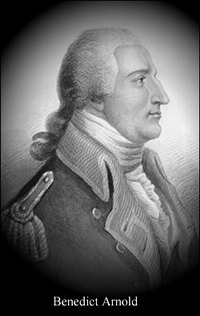Login form
Benedict Arnold

General Benedict Arnold was a hero in the early years of the American Revolution (1775-1783). He later became the most famous traitor in United States history. How did this happen?
EARLY LIFE
Benedict Arnold was born on January 14, 1741, in Norwich, Connecticut. At age 14 he began working for a druggist (someone who sells medicines). But he liked adventure. He ran away and fought with British forces in the French and Indian War (1754-1763). After his father died in 1761, he returned home and became a druggist. His business prospered.
BRAVERY IN BATTLE
After the Revolutionary War broke out in 1775, Arnold became a colonel in the Continental Army. He helped seize Fort Ticonderoga in New York from the British. He then led a daring winter attack on British forces in Canada. Although Arnold was forced to retreat to New York, he was able to block a British attack. The British hoped to cut New England off from New York and other colonies south of New England. Arnold cleverly stopped the British advance in 1776.
Arnold was promoted to brigadier general because of his bravery. He later became a major general. In 1777, he led troops in a major American victory at Saratoga, New York.
MARRIAGE AND TROUBLE
In 1778, Arnold was made commander of Philadelphia. He married a woman from a family loyal to the British. The Arnolds spent lots of money to keep up a busy social life. Soon they were in debt.
Arnold began to quarrel with people in authority. He felt he had been treated badly by Congress and the Continental Army. In exchange for money, the Arnolds provided the British with information about American military plans. In 1780, Arnold was commander of West Point, an important American fort near New York City. He planned to turn it over to the enemy for money and a high rank in the British army. However, the plot was discovered, and Arnold went over to the British side.
A BRITISH GENERAL
As a British brigadier general in 1780 and 1781, Arnold led raids in Virginia and Connecticut. After the British surrendered in 1781, Arnold and his family sailed to England. His life in England was not successful, and he had little money. Arnold died in London, England, on June 14, 1801.
Source: Microsoft ® Encarta

